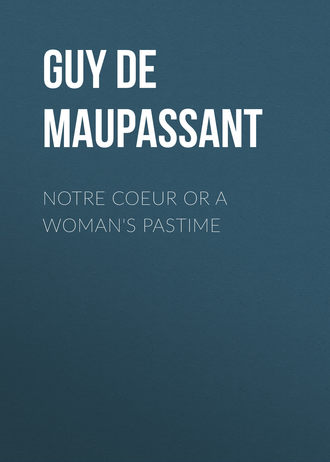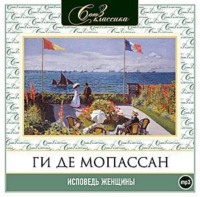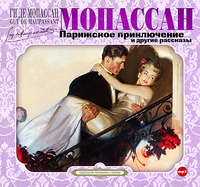 полная версия
полная версияNotre Coeur or A Woman's Pastime
"This theory was plausible. The man appeared so sure of himself and so pitiful, that we should have acquitted him without doubt, if two overwhelming discoveries had not been made at one blow. The first was a snuffbox full of ground glass! It was his own snuffbox, in a secret drawer of his secretary, where he kept his money.
"He explained this in a manner not acceptable, by saying that it was the last ruse of an unknown guilty one. But a merchant of Saint-Marlouf presented himself at the house of the judge, telling him that Moiron had bought needles of him many times, the finest needles he could find, breaking them to see whether they suited him.
"The merchant brought as witnesses a dozen persons who recognized Moiron at first glance. And the inquest revealed the fact that the schoolmaster was at Saint-Marlouf on the days designated by the merchant.
"I pass over the terrible depositions of the children upon the master's choice of dainties, and his care in making the little ones eat in his presence and destroying all traces of the feast.
"Public opinion, exasperated, recalled capital punishment, and took on a new force from terror which permitted no delays or resistance.
"Moiron was condemned to death. His appeal was rejected. No recourse remained to him for pardon. I knew from my father that the Emperor would not grant it.
"One morning, as I was at work in my office, the chaplain of the prison was announced. He was an old priest who had a great knowledge of men and a large acquaintance among criminals. He appeared troubled and constrained. After talking a few moments of other things, he said abruptly, on rising:
"'If Moiron is decapitated, Monsieur Attorney-General, you will have allowed the execution of an innocent man.'
"Then, without bowing, he went out, leaving me under the profound effect of his words. He had pronounced them in a solemn, affecting fashion, opening lips, closed and sealed by confession, in order to save a life.
"An hour later I was on my way to Paris, and my father, at my request, asked an immediate audience with the Emperor.
"I was received the next day. Napoleon III. was at work in a little room when we were introduced. I exposed the whole affair, even to the visit of the priest, and, in the midst of the story, the door opened behind the chair of the Emperor, and the Empress, who believed in him alone, entered. His Majesty consulted her. When she had run over the facts, she exclaimed:
"'This man must be pardoned! He must, because he is innocent.'
"Why should this sudden conviction of a woman so pious throw into my mind a terrible doubt?
"Up to that time I had ardently desired a commutation of the sentence. And now I felt myself the puppet, the dupe of a criminal ruse, which had employed the priest and the confession as a means of defense.
"I showed some hesitation to their Majesties. The Emperor remained undecided, solicited on one hand by his natural goodness, and on the other held back by the fear of allowing himself to play a miserable part; but the Empress, convinced that the priest had obeyed a divine call, repeated: 'What does it matter? It is better to spare a guilty man than to kill an innocent one.' Her advice prevailed. The penalty of death was commuted, and that of hard labor was substituted.
"Some years after I heard that Moiron, whose exemplary conduct at Toulon had been made known again to the Emperor, was employed as a domestic by the director of the penitentiary. And then I heard no word of this man for a long time.
"About two years after this, when I was passing the summer at the house of my cousin, De Larielle, a young priest came to me one evening, as we were sitting down to dinner, and wished to speak to me.
"I told them to let him come in, and he begged me to go with him to a dying man, who desired, before all else, to see me. This had happened often, during my long career as judge, and, although I had been put aside by the Republic, I was still called upon from time to time in like circumstances.
"I followed the ecclesiastic, who made me mount into a little miserable lodging, under the roof of a high house. There, upon a pallet of straw, I found a dying man, seated with his back against the wall, in order to breathe. He was a sort of grimacing skeleton, with deep, shining eyes.
"When he saw me he murmured: 'You do not know me?'
"'No.'
"'I am Moiron.'
"I shivered, but said: 'The schoolmaster?'
"'Yes.'
"'How is it you are here?'
"'That would be too long – I haven't time – I am going to die – They brought me this curate – and as I knew you were here, I sent him for you – It is to you that I wish to confess – since you saved my life before – the other time – '
"He seized with his dry hands the straw of his bed, and continued, in a rasping, bass voice:
"'Here it is – I owe you the truth – to you, because it is necessary to tell it to some one before leaving the earth.
"'It was I who killed the children – all – it was I – for vengeance!
"'Listen. I was an honest man, very honest – very honest – very pure – adoring God – the good God – the God that they teach us to love, and not the false God, the executioner, the robber, the murderer who governs the earth – I had never done wrong, never committed a villainous act. I was pure as one unborn.
"'After I was married I had some children, and I began to love them as never father or mother loved their own. I lived only for them. I was foolish. They died, all three of them! Why? Why? What had I done? I? I had a change of heart, a furious change. Suddenly I opened my eyes as of one awakening; and I learned that God is wicked. Why had He killed my children? I opened my eyes and I saw that He loved to kill. He loves only that, Monsieur. He exists only to destroy! God is a murderer! Some death is necessary to Him every day. He causes them in all fashions, the better to amuse Himself. He has invented sickness and accident in order to divert Himself through all the long months and years. And, when He is weary, He has epidemics, pests, the cholera, quinsy, smallpox.
"'How do I know all that this monster has imagined? All these evils are not enough to suffice. From time to time He sends war, in order to see two hundred thousand soldiers laid low, bruised in blood and mire, with arms and legs torn off, heads broken by bullets, like eggs that fall along the road.
"'That is not all. He has made men who eat one another. And then, as men become better than He, He has made beasts to see the men chase them, slaughter, and nourish themselves with them. That is not all. He has made all the little animals that live for a day, flies which increase by myriads in an hour, ants, that one crushes, and others, many, so many that we cannot even imagine them. And all kill one another, chase one another, devour one another, murdering without ceasing. And the good God looks on and is amused, because He sees all for Himself, the largest as well as the smallest, those which are in drops of water, as well as those in the stars. He looks at them all and is amused! Ugh! Beast!
"'So I, Monsieur, I also have killed some children. I acted the part for Him. It was not He who had them. It was not He, it was I. And I would have killed still more, but you took me away. That's all!
"'I was going to die, guillotined. I! How He would have laughed, the reptile! Then I asked for a priest, and lied to him. I confessed. I lied, and I lived.
"'Now it is finished. I can no longer escape Him. But I have no fear of Him, Monsieur, I understand Him too well.'
"It was frightful to see this miserable creature, hardly able to breathe, talking in hiccoughs, opening an enormous mouth to eject some words scarcely heard, pulling up the cloth of his straw bed, and, under a cover nearly black, moving his meager limbs as if to save himself.
"Oh! frightful being and frightful remembrance!
"I asked him: 'You have nothing more to say?'
"'No, Monsieur.'
"'Then, farewell.'
"'Farewell, sir, one day or the other.'
"I turned toward the priest, whose somber silhouette was on the wall.
"'You will remain, M. Abbé?'
"'I will remain.'
"Then the dying man sneered: 'Yes, yes, he sends crows to dead bodies.'
"As for me, I had seen enough. I opened the door and went away in self-protection."
AN OLD MAID
In Argenteuil they called her Queen Hortense. No one ever knew the reason why. Perhaps because she spoke firmly, like an officer in command. Perhaps because she was large, bony, and imperious. Perhaps because she governed a multitude of domestic animals, hens, dogs, cats, canaries, and parrots, – those animals so dear to old maids. But she gave these familiar subjects neither dainties, nor pretty words, nor those tender puerilities which seem to slip from the lips of a woman to the velvety coat of the cat she is fondling. She governed her beasts with authority. She ruled.
She was an old maid, one of those old maids with cracked voice, and awkward gesture, whose soul seems hard. She never allowed contradiction from any person, nor argument, nor would she tolerate hesitation, or indifference, or idleness, or fatigue. No one ever heard her complain, or regret what was, or desire what was not. "Each to his part," she said, with the conviction of a fatalist. She never went to church, cared nothing for the priests, scarcely believed in God, and called all religious things "mourning merchandise."
For thirty years she had lived in her little house, with its tiny garden in front, extending along the street, never modifying her garments, changing only maids, and that mercilessly, when they became twenty-one years old.
She replaced, without tears and without regrets, her dogs or cats or birds, when they died of old age, or by accident, and she buried trespassing animals in a flower-bed, heaping the earth above them and treading it down with perfect indifference.
She had in the town some acquaintances, the families of employers, whose men went to Paris every day. Sometimes they would invite her to go to the theater with them. She inevitably fell asleep on these occasions, and they were obliged to wake her when it was time to go home. She never allowed anyone to accompany her, having no fear by night or day. She seemed to have no love for children.
She occupied her time with a thousand masculine cares, carpentry, gardening, cutting or sawing wood, repairing her old house, even doing mason's work when it was necessary.
She had some relatives who came to see her twice a year. Her two sisters, Madame Cimme and Madame Columbel, were married, one to a florist, the other to a small householder. Madame Cimme had no children; Madame Columbel had three: Henry, Pauline, and Joseph. Henry was twenty-one, Pauline and Joseph were three, having come when one would have thought the mother past the age. No tenderness united this old maid to her kinsfolk.
In the spring of 1882, Queen Hortense became suddenly ill. The neighbors went for a physician, whom she drove away. When the priest presented himself she got out of bed, half naked, and put him out of doors. The little maid, weeping, made gruel for her.
After three days in bed, the situation became so grave that the carpenter living next door, after counsel with the physician (now reinstated with authority), took it upon himself to summon the two families.
They arrived by the same train, about ten o'clock in the morning; the Columbels having brought their little Joseph.
When they approached the garden gate, they saw the maid seated in a chair against the wall, weeping. The dog lay asleep on the mat before the door, under a broiling sun; two cats, that looked as if dead, lay stretched out on the window-sills, with eyes closed and paws and tails extended at full length. A great glossy hen was promenading before the door, at the head of a flock of chickens, covered with yellow down, and in a large cage hung against the wall, covered with chickweed, were several birds, singing themselves hoarse in the light of this hot spring morning.
Two others, inseparable, in a little cage in the form of a cottage, remained quiet, side by side on their perch.
M. Cimme, a large, wheezy personage, who always entered a room first, putting aside men and women when it was necessary, remarked to the maid: "Eh, Celeste! Is it so bad as that?"
The little maid sobbed through her tears:
"She doesn't know me any more. The doctor says it is the end."
They all looked at one another.
Madame Cimme and Madame Columbel embraced each other instantly, not saying a word.
They resembled each other much, always wearing braids of hair and shawls of red cashmere, as bright as hot coals.
Cimme turned toward his brother-in-law, a pale man, yellow and thin, tormented by indigestion, who limped badly, and said to him in a serious tone:
"Gad! It was time!"
But no one dared to go into the room of the dying woman situated on the ground floor. Cimme himself stopped at that step. Columbel was the first to decide upon it; he entered, balancing himself like the mast of a ship, making a noise on the floor with the iron of his cane.
The two women ventured to follow, and M. Cimme brought up the line.
Little Joseph remained outside, playing with the dog.
A ray of sunlight fell on the bed, lighting up the hands which moved nervously, opening and shutting without ceasing. The fingers moved as if a thought animated them, as if they would signify something, indicate some idea, obey some intelligence. The rest of the body remained motionless under the covers. The angular figure gave no start. The eyes remained closed.
The relatives arranged themselves in a semicircle and, without saying a word, regarded the heaving breast and the short breathing. The little maid had followed them, still shedding tears.
Finally, Cimme asked: "What was it the doctor said?"
The servant whispered: "He said we should leave her quiet, that nothing more could be done."
Suddenly the lips of the old maid began to move. She seemed to pronounce some silent words, concealed in her dying brain, and her hands quickened their singular movement.
Then she spoke in a little, thin voice, quite unlike her own, an utterance that seemed to come from far off, perhaps from the bottom of that heart always closed.
Cimme walked upon tiptoe, finding this spectacle painful. Columbel, whose lame leg wearied him, sat down.
The two women remained standing.
Queen Hortense muttered something quickly, which they were unable to understand. She pronounced some names, called tenderly some imaginary persons:
"Come here, my little Philip, kiss your mother. You love mamma, don't you, my child? You, Rose, you will watch your little sister while I am out. Especially, don't leave her alone, do you hear? And I forbid you to touch matches."
She was silent some seconds; then, in a loud tone, as if she would call, she said: "Henrietta!" She waited a little and continued: "Tell your father to come and speak to me before going to his office." Then suddenly: "I am suffering a little to-day, dear; promise me you will not return late; you will tell your chief that I am ill. You know it is dangerous to leave the children alone when I am in bed. I am going to make you a dish of rice and sugar for dinner. The little ones like it so much. Claire will be the happy one!"
She began to laugh, a young and noisy laugh, as she had never laughed before. "Look, John," she said, "what a droll head he has. He has smeared himself with the sugarplums, the dirty thing! Look! my dear, how funny he looks!"
Columbel, who changed the position of his lame leg every moment, murmured: "She is dreaming that she has children and a husband; the end is near."
The two sisters did not move, but seemed surprised and stupid.
The little maid said: "Will you take off your hats and your shawls, and go into the other room?"
They went out without having said a word. And Columbel followed them limping, leaving the dying woman alone again.
When they were relieved of their outer garments, the women seated themselves. Then one of the cats left the window, stretched herself, jumped into the room, then upon the knees of Madame Cimme, who began to caress her.
They heard from the next room the voice of agony, living, without doubt, in this last hour, the life she had expected, living her dreams at the very moment when all would be finished for her.
Cimme, in the garden, played with the little Joseph and the dog, amusing himself much, with the gaiety of a great man in the country, without thought of the dying woman.
But suddenly he entered, addressing the maid: "Say, then, my girl, are you going to give us some luncheon? What are you going to eat, ladies?"
They decided upon an omelet of fine herbs, a piece of fillet with new potatoes, a cheese, and a cup of coffee.
And as Madame Columbel was fumbling in her pocket for her purse: Cimme stopped her, and turning to the maid said, "You need money?" and she answered: "Yes, sir."
"How much?"
"Fifteen francs."
"Very well. Make haste, now, my girl, because I am getting hungry."
Madame Cimme, looking out at the climbing flowers bathed in the sunlight, and at two pigeons making love on the roof opposite, said, with a wounded air: "It is unfortunate to have come for so sad an event. It would be nice in the country, to-day."
Her sister sighed without response, and Columbel murmured, moved perhaps by the thought of a walk:
"My leg plagues me awfully."
Little Joseph and the dog made a terrible noise, one shouting with joy and the other barking violently. They played at hide-and-seek around the three flower-beds, running after each other like mad.
The dying woman continued to call her children, chatting with each, imagining that she was dressing them, that she caressed them, that she was teaching them to read: "Come, Simon, repeat, A, B, C, D. You do not say it well; see, D, D, D, do you hear? Repeat, then – "
Cimme declared: "It is curious what she talks about at this time."
Then said Madame Columbel: "It would be better, perhaps, to go in there."
But Cimme dissuaded her from it:
"Why go in, since we are not able to do anything for her? Besides we are as well off here."
No one insisted. Madame observed the two green birds called inseparable. She remarked pleasantly upon this singular fidelity, and blamed men for not imitating these little creatures. Cimme looked at his wife and laughed, singing with a bantering air, "Tra-la-la, Tra-la-la," as if to say he could tell some things about her fidelity to him.
Columbel, taken with cramps in his stomach, struck the floor with his cane. The other cat entered, tail in the air. They did not sit down at table until one o'clock.
When he had tasted the wine, Columbel, whom some one had recommended to drink only choice Bordeaux, called the servant:
"Say, is there nothing better than this in the cellar?"
"Yes, sir; there is some of the wine that was served to you when you were here before."
"Oh, well, go and bring three bottles."
They tasted this wine, which seemed excellent. Not that it proved to be remarkable, but it had been fifteen years in the cellar. Cimme declared it was just the wine for sickness.
Columbel, seized with a desire of possessing some of it, asked of the maid: "How much is left of it, my girl?"
"Oh, nearly all, sir; Miss never drinks any of it. It is the heap at the bottom."
Then Columbel turned toward his brother-in-law: "If you wish, Cimme, I will take this wine instead of anything else; it agrees with my stomach wonderfully."
The hen, in her turn, had entered with her troop of chickens; the two women amused themselves by throwing crumbs to them. Joseph and the dog, who had eaten enough, returned to the garden.
Queen Hortense spoke continually, but the voice was lower now, so that it was no longer possible to distinguish the words.
When they had finished the coffee, they all went in to learn the condition of the sick one. She seemed calm.
They went out and seated themselves in a circle in the garden, to aid digestion.
Presently the dog began to run around the chairs with all speed, carrying something in his mouth. The child ran after him violently. Both disappeared into the house. Cimme fell asleep, with his stomach in the sun.
The dying one began to speak loud again. Then suddenly she shouted.
The two women and Columbel hastened in to see what had happened. Cimme awakened but did not move, liking better things as they were.
The dying woman was sitting up, staring with haggard eyes. Her dog, to escape the pursuit of little Joseph, had jumped upon the bed, startling her from the death agony. The dog was intrenched behind the pillow, peeping at his comrade with eyes glistening, ready to jump again at the least movement. He held in his mouth one of the slippers of his mistress, shorn of its heel in the hour he had played with it.
The child, intimidated by the woman rising so suddenly before him, remained motionless before the bed.
The hen, having just entered, had jumped upon a chair, frightened by the noise. She called desperately to her chickens, which peeped, frightened, from under the four legs of the seat.
Queen Hortense cried out with a piercing tone: "No, no, I do not wish to die! I am not willing! Who will bring up my children? Who will care for them? Who will love them? No, I am not willing! I am not – "
She turned on her back. All was over.
The dog, much excited, jumped into the room and skipped about.
Columbel ran to the window and called his brother-in-law: "Come quickly! come quickly! I believe she is gone."
Then Cimme got up and resolutely went into the room, muttering: "It was not as long as I should have believed."
COMPLICATION
After swearing for a long time that he would never marry, Jack Boudillère suddenly changed his mind. It happened one summer at the seashore, quite unexpectedly.
One morning, as he was extended on the sand, watching the women come out of the water, a little foot caught his attention, because of its slimness and delicacy. Raising his eyes higher, the entire person seemed attractive. Of this entire person he had, however, seen only the ankles and the head, emerging from a white flannel bathing suit, fastened with care. He may be called sensuous and impressionable, but it was by grace of form alone that he was captured. Afterward, he was held by the charm and sweet spirit of the young girl, who was simple and good and fresh, like her cheeks and her lips.
Presented to the family, he was pleased, and straightway became love-mad. When he saw Bertha Lannis at a distance, on the long stretch of yellow sand, he trembled from head to foot. Near her he was dumb, incapable of saying anything or even of thinking, with a kind of bubbling in his heart, a humming in his ears, and a frightened feeling in his mind. Was this love?
He did not know, he understood nothing of it, but the fact remained that he was fully decided to make this child his wife.
Her parents hesitated a long time, deterred by the bad reputation of the young man. He had a mistress, it was said, – an old mistress, an old and strong entanglement, one of those chains that is believed to be broken, but which continues to hold, nevertheless. Beyond this, he had loved, for a longer or shorter period, every woman who had come within reach of his lips.
But he withdrew from the woman with whom he had lived, not even consenting to see her again. A friend arranged her pension, assuring her a subsistence. Jack paid, but he did not wish to speak to her, pretending henceforth that he did not know her name. She wrote letters which he would not open. Each week brought him a new disguise in the handwriting of the abandoned one. Each week a greater anger developed in him against her, and he would tear the envelope in two, without opening it, without reading a line, knowing beforehand the reproaches and complaints of the contents.
One could scarcely credit her perseverance, which lasted the whole winter long, and it was not until spring that her demand was satisfied.
The marriage took place in Paris during the early part of May. It was decided that they should not take the regular wedding journey. After a little ball, composed of a company of young cousins who would not stay past eleven o'clock, and would not prolong forever the cares of the day of ceremony, the young couple intended to pass their first night at the family home and to set out the next morning for the seaside, where they had met and loved.








